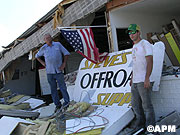 |
| A sign posted outside of the elementary-school-turned-police-station. (Courtesy Sgt. John Wright, Cmdr. Joe Neuberger and Sgt. John Pyka) |
St. Paul, Minn. — Members of a St. Paul SWAT team say the New Orleans police officers they relieved in late September had worked 26 consecutive days, including some 20-hour shifts. So, St. Paul officer Ron Lenner had a ready answer when asked what was most rewarding about the trip.
"Seeing the smiles on their faces when they were told 'you get your 5 days off. Go home. St. Paul's here, they'll cover for us.' They loved that. And it felt good for us to be able to say 'We got your back. We got ya. Go ahead, go home,'" Lenner said.
St. Paul Police Chief John Harrington had his officers drive their squad cars down to New Orleans. Lenner and his colleagues initially lived in tents, but soon moved into a former elementary school, taking cold showers under a garden hose to clean off the film of grit and grime that hung in the stagnant air.
Sgt. John Pyka says after spending a couple of weeks with people who had lost everything, he left New Orleans with more compassion -- for his colleagues, for the people they serve, for everyone.
|
Chief Harrington... he's going to get better cops, who are going to be better citizens, I'm going to be a better father, a better friend for my friends. We're just better people for going down there.
- Sgt. John Pyka
|
"All we had was each other down there," he said. "We relied on each other. We relied on these cops, they relied on us. And that's all you have when things fall apart, is you have each other. And you pool together, you band together and you get things accomplished. That's what these guys did. And I think the chief -- Chief Harrington -- he's going to get better cops, who are going to be better citizens, I'm going to be a better father, a better friend for my friends. We're just better people for going down there."
Doing any type of work is difficult on the Gulf Coast and that includes police work. Commander Joe Neuberger came back to St. Paul raving about the commitment of his peers in the Crescent City.
"They were working 20-plus hour shifts with no days off, in spite of the fact they'd lost their homes, their cars, their familiies were either at other locations or locations they couldn't get at. That kind of dedication is just unbelievable. One of the stories... John and I helped with an arrest and one of the cops looked at us and said 'do you have a pair of handcuffs that work?' Because his were lost in the flood and his partner's didn't work anymore because of the corrosion. And it's simple things like that that we take for granted," according to Neuberger.
Communication was also spotty. Neuberger says 911 service was restored two weeks into their stay in New Orleans. Many calls for police service were made in person by people flagging down squad cars. Much of the technology that officers normally rely on was unavailable.
Sgt. Pyka says officers frequently used cell phones to call their St. Paul colleagues, who were better positioned to look up necessary information.
"We were calling back home to our communications center just to find out if a car was stolen or if somebody had warrants or to run a stolen check on a gun. That was the easiest way to get through. We'd call our dispatch and tell them where we were and what we had," Pyka said.
Sometimes even explaining where they were was not so simple. When the lights are out in an unfamiliar city, navigation skills become more important. Cmdr. Neuberger says a former Minnesota governor who found St. Paul's street layout confusing would be even more confounded by New Orleans.
"Everything is circles and straights -- the names would change four or five times on one straight stretch. Of course, the New Orleans folks know this inside out, so we'd hear them talking on the radio coupled with that southern accent -- by the way, they think we talk funny -- but we'd hear this dispatch call and between the three of us we're trying to figure out 'what street was that, again?'" Neuberger said.
For all of the hardships they endured, the St. Paul officers say they return to Minnesota inspired by what they encountered in Louisiana.






